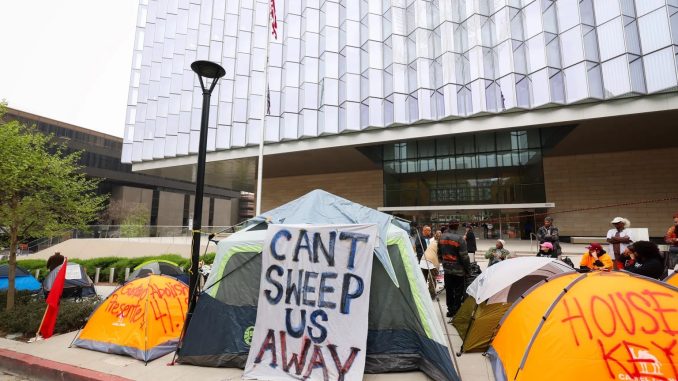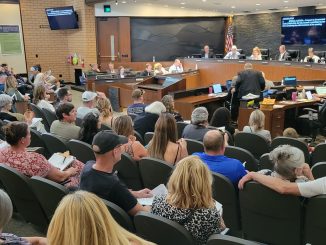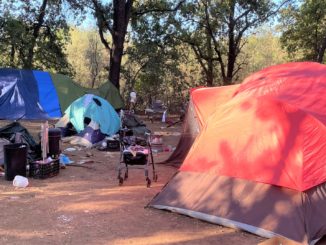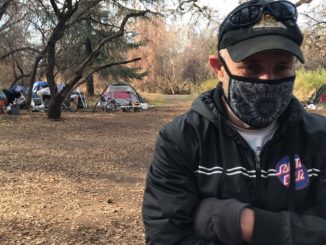
This story on Supreme Court case of whether or not 8th Amendment protects the unhoused was produced by CalMatters, an independent public journalism venture covering California state politics and government. For more info, visit calmatters.org.
By Marisa Kendall (for CalMatters)
In a case that could drastically alter how cities in California and beyond deal with homeless encampments, U.S. Supreme Court justices yesterday weighed whether to allow broader punishment for people camping in public spaces.
“Laws like ours, they really do serve an essential purpose,” said Theane Evangelis, arguing on behalf of the city of Grants Pass, Oregon, which banned encampments. “They protect the health and safety of everyone. It is not safe to live in encampments. It’s unsanitary, we see what’s happening. And there are the harms of the encampments on those in them and outside.”
If the justices side with Grants Pass, they could roll back limits that for years have curtailed cities’ ability to clear encampments and punish campers. Two prior Ninth Circuit appellate rulings determined that penalizing an unhoused person for camping in public, if they have nowhere else to sleep, violates the Constitution’s 8th Amendment ban on cruel and unusual punishment.
The Supreme Court’s opinion is expected in late June. However the justices come down, it will affect cities throughout the country. But nowhere will it be felt as acutely as in California, where nearly half of the country’s entire unsheltered homeless population lives.
What’s at stake in the Grants Pass case?
The case, Johnson vs. Grants Pass, stems from a 2018 lawsuit challenging ordinances that ban camping even when there are no beds available in a homeless shelter. Because humans need to sleep somewhere, homeless residents of Grants Pass sued, claiming the ordinance criminalizes them for being homeless and violates the 8th Amendment.
“The ordinances by design make it physically impossible for homeless people to live in Grants Pass without facing endless fines and jail time,” said attorney Kelsi Brown Corkran, who argued on behalf of the homeless respondents yesterday.
The lower courts sided with the homeless residents. Now, Grants Pass is asking the Supreme Court to overturn that ruling.
More than three dozen elected officials and organizations — including California Gov. Gavin Newsom — filed briefs weighing in on the case. Cities, law enforcement agencies and Newsom say the prior rulings tie their hands as they try to manage dangerous and unsanitary encampments. Several cities, including San Francisco, Sacramento, Chico and San Rafael, have been hit with court orders stopping or delaying them from clearing encampments.
But advocates for the civil rights of unhoused people worry if the former rulings are overturned, cities will be able to arrest people just for being homeless.
What did the justices say?
At times, the Supreme Court seemed divided along ideological lines, with the liberal justices appearing more sympathetic to the homeless residents’ arguments than their conservative counterparts. The Supreme Court has a 6-3 conservative majority.
Justices Sonia Sotomayor and Elena Kagan, both appointees of former President Barack Obama, grilled the Grants Pass attorney over her claim that the city’s ordinance does not make it a crime to be homeless.
“Where do we put them if every city, every village, every town lacks compassion and passes a law identical to this?” Sotomayor asked. “Where are they supposed to sleep? Are they supposed to kill themselves not sleeping?”
But even Justice Brett Kavanaugh, an appointee of former President Donald Trump, poked holes in the Grants Pass argument that the city’s camping ban helps get people off the street and into shelter.
“How does it help if there are not enough beds for the number of homeless people in the jurisdiction?” he asked the Grants Pass lawyer.
“This is a difficult policy question,” Evangelis answered, adding that the ordinance encourages people to accept shelter beds when they open up.
After multiple citations under the Grants Pass ordinance, a homeless resident could go to jail. What then? Kavanaugh asked. “You end up in jail for 30 days, and then you get out, I mean, you’re not going to be any better off than you were before in finding a bed,” he said.
Evangelis insisted an arrest often is what pushes people to finally accept help, whether it’s treatment or other services.
The justices homed in on a key question of the case: Because Grants Pass prohibits camping throughout the entire city, does the ordinance criminalize the status of being homeless? Or does the ordinance criminalize the behavior of camping in public?
That’s important because, decades earlier, the Supreme Court found a person cannot be punished for their status, but only for their actions — someone cannot be arrested for being addicted to drugs, for example, but they can be arrested for using drugs.
In addressing the status-versus-action question, the justices ventured down some philosophical rabbit holes. The conservative justices scrutinized the rationale used in the prior rulings, and at times seemed reluctant to dole out 8th Amendment protections in this case.
“Is being a bank robber a status?” Chief Justice John Roberts Jr., an appointee of former President George Bush, asked. And: If someone is hungry and needs food to survive, can they be punished for breaking into a store?
If someone has no access to a bathroom, can they be punished for urinating or defecating in the street? Justice Amy Coney Barrett, a Trump appointee, asked. Where do we draw the line? She wanted to know.
Supporters of the homeless plaintiffs in Grants Pass say this isn’t a liberal-versus-conservative issue.
“We can’t predict what the court is going to do, but every single time the court has heard this question, they’ve agreed that punishing people for sleeping outside when they have nowhere else to go is cruel and unusual,” Jesse Rabinowitz, communications director for the National Homelessness Law Center, said during a media call that included a lawyer representing the homeless respondents. “So we remain hopeful that the Supreme Court will do the right thing and agree with all the lower courts’ decisions and affirm that everybody, regardless of housing status, is protected by the constitution.”
Lawyers for Grants Pass did not respond to emails seeking comment. CalMatters also reached out to organizations supporting Grants Pass, including the League of California Cities, Chamber of Commerce, California Police Chiefs Association and the California State Association of Counties, but none responded with a comment on the case.
People rally at the courthouse
As the justices considered the case today, hundreds of people rallied in front of the Supreme Court in Washington D.C. to speak out against criminalizing homelessness. People also gathered in Los Angeles, Sacramento and San Francisco.
By late morning in Los Angeles, an overnight protest and live viewing of the legal arguments in Washington were giving way to a downtown rally.
Currently and formerly homeless people, activists and attorneys gathered outside the LA federal courthouse, where about 20 tents lined the sidewalk and a few dozen attendees took turns speaking, chanting and singing. Speakers wore black-and-red t-shirts that read: “If everyone can’t afford the rent, they shouldn’t f*cking take our tent.”
Pete White, executive director of event organizer the Los Angeles Community Action Network, said the event was not just a gathering to protest encampment sweeps, but a chance to organize against an onslaught of local measures adding criminal penalties for street homelessness.
“House keys not handcuffs,” White sang in a call and response with the crowd. “The rent, the rent is too damn high.”
Nancy Berlin, an organizer with the Poor People’s Campaign, focused on the legal implications for the state’s estimated 181,000 unhoused residents. She worried in particular about those living outside in smaller towns away from major cities, where resources are already fewer and farther between.
“It would be like a California earthquake,” Berlin said, “to have all those people criminalized and arrested.”
The issues at stake are personal to downtown LA resident Lorraine Morland, who spent eight years in the 1980s and 90s sleeping in doorways near Skid Row. She said she was scared onto the street after staying in what she remembered as a violent and dangerous shelter. She credits a persistent nun with convincing her to try a different shelter, get sober and sign up for a housing voucher.
But today, Morland said she sees the road out of homelessness getting harder to forge, with years-long waitlists for similar vouchers and rents higher than ever.
“It’s not about tents,” Morland said. “It’s about housing.”
“You see that land over there?” Morland asked, motioning toward a giant dirt lot just down the street, surrounded by a chain-link fence. “Why can’t they have tents there?”




Be the first to comment